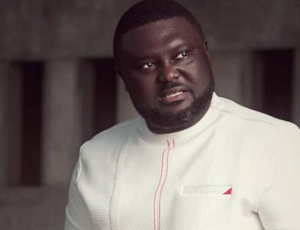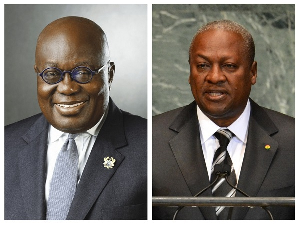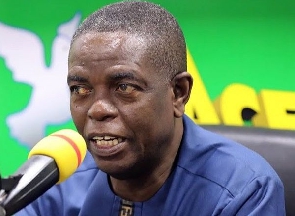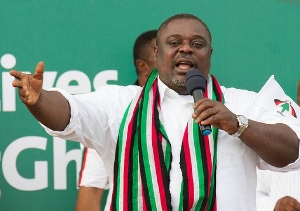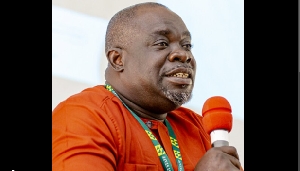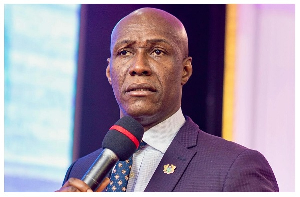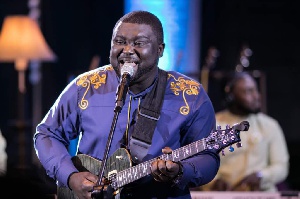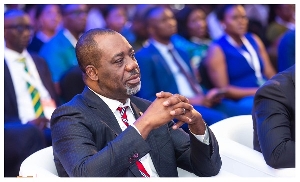SPEECH DELIVERED BY HIS EXCELLENCY JOHN EVANS ATTA MILLS
PRESIDENT OF THE REPUBLIC OF GHANA, AT THE 66TH GENERAL ASSEMBLY OF THE UNITED NATIONS, ON FRIDAY 23RD SEPTEBER, 2011.
Mr. President, Permit me to extend hearty congratulations to you on your election as the President of the 66th Regular Session of the General Assembly.
We are confident that you will perform this task with distinction.
May I also use this opportunity to express our sincere thanks to your predecessor, Mr, Joseph Deiss for the excellent manner in which he presided over the 65th Session.
Mr. President, Ghana joins the rest of the world to welcome our sister country, South Sudan to the family of the United Nations.
It is our fervent hope that South Sudan, while taking its rightful place in this august body, will grow and prosper.
We also congratulate the Secretary-General for his re-election to a Second Term.
It is indeed a manifestation of his excellent performance in steering the affairs of the United Nations during the last four years.
Mr. President, It is a long established fact that United Nations peacekeeping activities have contributed immensely to the Organization's efforts towards the maintenance of international peace and security over the years.
At the same time, we all recognize that this accomplishment continues to take on complex dimensions that require long-term planning and strategic reforms to enable the United Nations effectively deal with the peacekeeping and peace-building challenges around the world.
It is in this regard that I re-affirm Ghana's support for the on¬going reform agenda being undertaken by the United Nations in consultation with Troop and Police Contributing Countries (TCCs and PCCs].
We do, however, emphasize the importance of regular tripartite consultations between the Security Council, the Secretariat, and TCCs to ensure the successful execution of mandates in the respective peacekeeping operation areas.
Mr. President, As one of the top contributors of troops and police personnel to UN peacekeeping operations, Ghana remains unwavering in its commitment to the ideals and objectives of the United Nations.
Accordingly, I wish to assure you that as long as financial, material and human capacity exist at the national level, Ghana will continue to provide personnel and resources in support of UN peacekeeping and peace-building efforts.
In this direction, we recognize the need to equitably share the burden and costs to the UN for policing conflict zones around the globe.
For this reason, it is important that nations that provide troops and other personnel for UN peacekeeping operations be financially supported by donor countries in a timely manner to ensure the success of the operation at hand.
While recognizing that financial constraints exist at all national levels, we, nevertheless, wish to encourage financing and donor countries to meet their obligations to the UN to enable TCCs and PCCs maintain their participation in current UN peacekeeping assignments.
Mr. President, Allow me, at this point, to pay tribute to all United Nations personnel, including those from my own country Ghana, who made the ultimate sacrifice during the course of the past year towards the preservation and maintenance of international peace and security while on UN assignment across the globe.
Their sacrifices will forever be remembered and cherished.
Mr. President, Another issue that we continue to follow with keen interest is the proposed Arms Trade Treaty (ATT).
Ghana fully supports the attainment of an Arms Trade Treaty [ATT], hence our satisfaction, thus far, with the outcomes of the ATT Preparatory Committee meetings held in New York in July, 2010 and February-March, 2011.
As a nation, we consider a strong and effective Arms Trade Treaty (ATT) an indispensable step in preventing the flow of conventional arms to destinations where they are likely to wreak havoc and mayhem by either fueling conflict and undermining both national and regional peace, security and development or exacerbating tensions that in many instances could likely create the conditions that necessitate the deployment of international peacekeepers in the first place.
For developing countries such as Ghana, the illicit proliferation of small arms and light weapons (SALW) and other conventional weaponry continues to pose a threat to our national security and socio-economic and political stability, given the former's close linkage to terrorism, organized crime, drugs and human trafficking, among others.
It is, therefore, imperative that the remaining ATT PrepComm meetings come out with proposals towards a future arms trade treaty that closes any loopholes that allow conventional weapons to flow from legitimate to illicit markets.
Mr. President, The United Nations Organization reached a significant milestone with the launch of UN Women, the United Nation's Entity for Gender Equality and the empowerment of women.
It is critical as members of the global community, to break the gender stereotypes which are the root causes of the myriad of gender inequality challenges currently facing most countries.
Ghana remains focused in addressing gender imbalances and misconceptions as well as improving the living conditions of its women and girls, bearing in mind that solving the gender issue would ultimately ensure the attainment of the majority of the Millennium Development Goals.
It is our expectation that the objectives and aims of UN Women will be met.
Mr. President, On the occasion of the high-level meeting to commemorate the 10th Anniversary of the Durban Declaration Plan of Action, Ghana recognizes the progress achieved in this area and the opportunity given Member States to strengthen and renew political commitment in the prevention and fight against racism and racial discrimination in all its forms.
We remain confident that the effective implementation of the outcome document will ensure the enjoyment of human rights and fundamental freedoms for all, including victims of racism, racial discrimination, xenophobia and related intolerance in all societies.
Mr. President, It is noteworthy that the high-level meeting on the prevention and control of non-communicable diseases focused on the developmental challenges and socio-economic impact of these diseases on developing countries due to the lack of healthcare capacity and social protection systems.
In this regard, we are of the view that the prevention of non-communicable disease would reduce poverty as well as decrease healthcare costs and improve productivity in developing countries thereby sustaining national economic development.
Efforts to improve our country's healthcare system includes the completion of several healthcare infrastructure nationwide, scaling up of the National Ambulance Service to cover all district capitals in the country, training Emergency Medical Technicians as well as re-engineering policies to give more meaning to healthcare delivery.
Mr. President, Ghana is a country that appreciates the contributions of its youth in the development of our democracy and nation building.
We believe that the adoption of the political declaration urging states to develop comprehensive policies and action plans to give more meaning to youth development is commendable especially in this International Year of the Youth.
Ghana is implementing a youth policy that is situating young men and women in the center of nation building.
As we continue to invest heavily in the youth by expanding education opportunities and making it possible for the less advantaged to benefit from formal schooling, we are confident that the right foundation is being built for take-off.
The provision of free school uniforms, free text books, and the elimination of over 1000 schools under trees and turning them into brick and mortar structures, is ample testimony of our commitment to brightening the future of Ghana's youth.
Ghana's gas and oil find also gives us greater opportunity to create the necessary environment for sustainable job creating avenues to comprehensively beat down youth unemployment numbers.
When it comes to the issue of ring-fencing the future of our youth, my Administration remains relentlessly committed to vigorously fighting the narcotics menace.
We will continue to make Ghana an unattractive destination for the drug barons and their assigns.
Indeed, the world must be made an unattractive place for the illicit drug trade.
Mr. President, Climate change is the defining human development challenge of the 21st century and one of the most challenging threats to sustainable development in Africa.
Although the continent contributes about 4% of the total Green House Gas Emissions (GHGJ, it is the most vulnerable to climate change in the world.
There is the need for urgent and concerted action to maximize the opportunities climate change presents.
With the right investment in infrastructure, institutions and technology by both the international community and nation states, we can unleash the potential of agriculture, harness the multiple benefits of water resources, expand access to modern energy, step up the fight against diseases and conserve tropical forest.
Mr. President, As we move closer to the climate change, negotiations in Durban, South Africa, it is our hope that the critical political questions that the Cancun climate conference did not answer will be addressed in Durban.
With regards to mitigation, we need political commitment, strong leadership and a high sense of flexibility to ensure that the 2nd commitment period of the Kyoto Protocol is renewed or at least some transitional arrangements are agreed upon in Durban if a full agreement is not achieved.
In addition, pledged commitments and actions by parties should be quantified, monitored and verified by the International Community.
We commend the notable progress made on the design of the institutions of adaptations such as the Green Climate Fund.
What is required now is the determination of the sources of funding for the Green Climate Fund, and for the Conference of Parties (COP) of the United Nations Framework Convention on Climate Change (UNFCCC) to be empowered to have more authority over climate funds.
Mr. President, On the political and security fronts, Ghana recognizes the paradigm shift, or at least a shift in emphasis from national security to human security.
It is human security targeted interventions that would help best define our national security.
We are therefore pursuing relevant action to concretize this concept through appropriate legal institutional and operational reforms.
We are also committed to the global norm of the Responsibility to Protect (R2P) and will continue to work closely with member-states, UN Friends of R2P, and the UN as a whole.
The Government has taken measures to strengthen the rule of law by enacting appropriate legislation to promote accountability and good governance, protect human rights, ensure the independence and integrity of the judiciary, free and fair elections, and the freedom of the media.
Mr. President, A year from now, Ghana will be going to the polls to elect a President and Members of Parliament for another 4 year term.
To ensure that Ghanaians enjoy an election which is peaceful, free and fair, the Electoral Commission, which has successfully conducted the last three elections, since 2000, has put in place measures that will safeguard the rights of the people to elect a government of their own choice.
Ghana's democratic credentials stand tall, and we intend to keep it that way.
Mr. President, Just as the United Nations and the international community kept and eye on the 2008 elections in Ghana, it is our hope that the same thing will be done next year.
Mr. President, Ghana wishes to reaffirm its fullest commitment to the ideals of the United Nations and advocates the mustering of the necessary political will that will allow the United Nations to function more effectively and efficiently.
I thank you for your kind attention.

